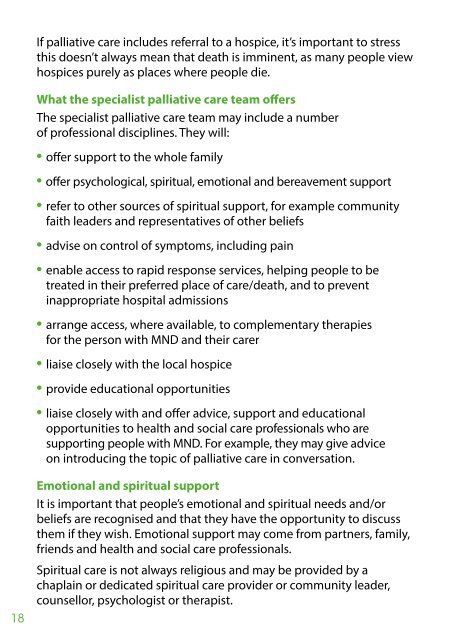A professional’s guide to end of life care in motor neurone disease (MND)
1QrDn0Q
1QrDn0Q
Create successful ePaper yourself
Turn your PDF publications into a flip-book with our unique Google optimized e-Paper software.
If palliative <strong>care</strong> <strong>in</strong>cludes referral <strong>to</strong> a hospice, it’s important <strong>to</strong> stress<br />
this doesn’t always mean that death is imm<strong>in</strong>ent, as many people view<br />
hospices purely as places where people die.<br />
What the specialist palliative <strong>care</strong> team <strong>of</strong>fers<br />
The specialist palliative <strong>care</strong> team may <strong>in</strong>clude a number<br />
<strong>of</strong> pr<strong>of</strong>essional discipl<strong>in</strong>es. They will:<br />
• <strong>of</strong>fer support <strong>to</strong> the whole family<br />
• <strong>of</strong>fer psychological, spiritual, emotional and bereavement support<br />
• refer <strong>to</strong> other sources <strong>of</strong> spiritual support, for example community<br />
faith leaders and representatives <strong>of</strong> other beliefs<br />
• advise on control <strong>of</strong> symp<strong>to</strong>ms, <strong>in</strong>clud<strong>in</strong>g pa<strong>in</strong><br />
• enable access <strong>to</strong> rapid response services, help<strong>in</strong>g people <strong>to</strong> be<br />
treated <strong>in</strong> their preferred place <strong>of</strong> <strong>care</strong>/death, and <strong>to</strong> prevent<br />
<strong>in</strong>appropriate hospital admissions<br />
• arrange access, where available, <strong>to</strong> complementary therapies<br />
for the person with <strong>MND</strong> and their <strong>care</strong>r<br />
• liaise closely with the local hospice<br />
• provide educational opportunities<br />
• liaise closely with and <strong>of</strong>fer advice, support and educational<br />
opportunities <strong>to</strong> health and social <strong>care</strong> pr<strong>of</strong>essionals who are<br />
support<strong>in</strong>g people with <strong>MND</strong>. For example, they may give advice<br />
on <strong>in</strong>troduc<strong>in</strong>g the <strong>to</strong>pic <strong>of</strong> palliative <strong>care</strong> <strong>in</strong> conversation.<br />
18<br />
Emotional and spiritual support<br />
It is important that people’s emotional and spiritual needs and/or<br />
beliefs are recognised and that they have the opportunity <strong>to</strong> discuss<br />
them if they wish. Emotional support may come from partners, family,<br />
fri<strong>end</strong>s and health and social <strong>care</strong> pr<strong>of</strong>essionals.<br />
Spiritual <strong>care</strong> is not always religious and may be provided by a<br />
chapla<strong>in</strong> or dedicated spiritual <strong>care</strong> provider or community leader,<br />
counsellor, psychologist or therapist.


